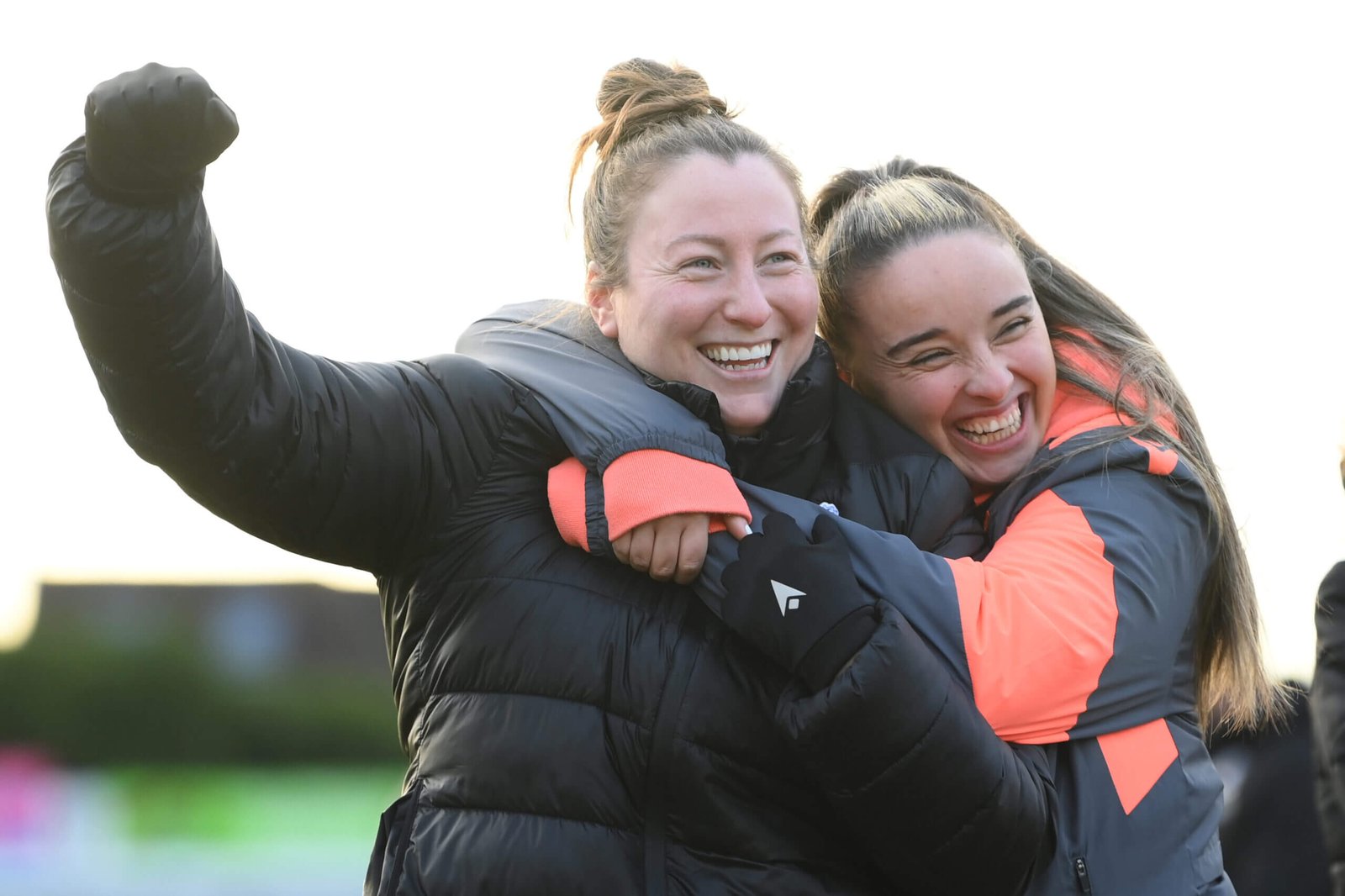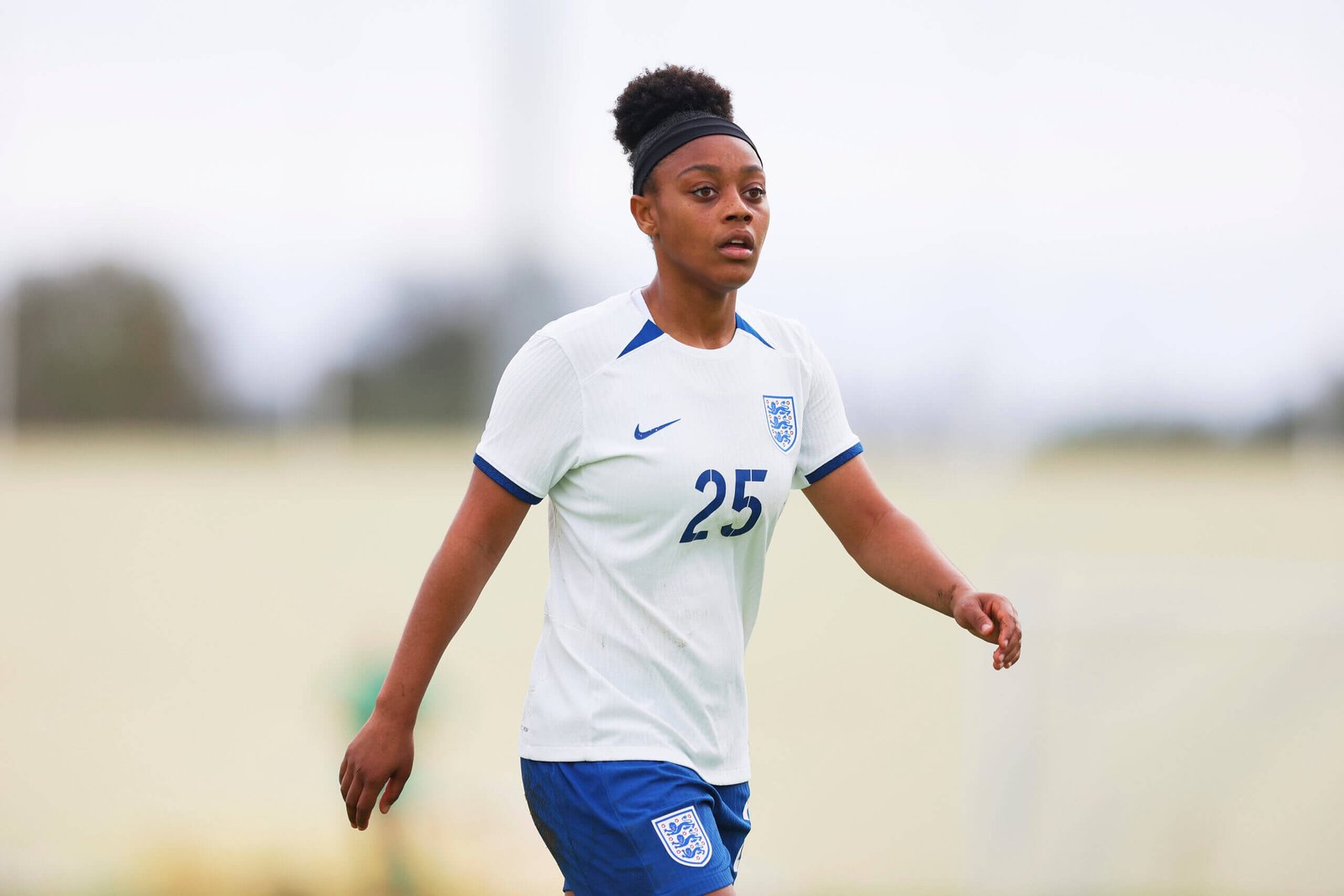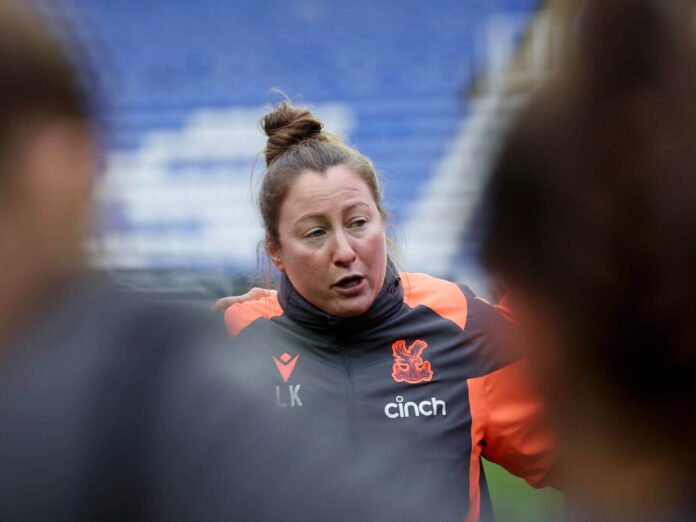It’s hard not to see the fixture as a meeting between two powerhouse female managers — one on the way out of the Women’s Super League (WSL) and the other doing everything she can to get into it.
Crystal Palace, led by Laura Kaminski, visit Emma Hayes’ cup holders Chelsea at Kingsmeadow in the fifth round of the FA Cup on Sunday.
Kaminski has only been Palace coach since July but the 36-year-old has been named Championship Manager of the Month for September, signed New Zealand international Ria Percival (fresh off her appearances for the co-hosts in the World Cup last summer) and helped the south Londoners secure this FA Cup last-16 spot.
Palace sit third in the Championship, three points behind leaders and neighbours Charlton Athletic with a game in hand.
Palace head coach Kaminski has FA Cup holders Chelsea in her sights (Eddie Keogh – The FA via Getty Images)
Kaminski has over 15 years of coaching experience at clubs such as Brighton & Hove Albion, Watford, Chelsea and Tottenham Hotspur.
Before her move to Palace — which is her first time leading a team — Kaminski worked as manager Karen Hills’ right-hand woman at Charlton for two seasons. It was Kaminski’s straight-talking coaching approach, coupled with her ability to use humour which gained her the respect of the players and staff.
“That’s a skill in itself, having a personality, being able to motivate, lead other people, empathise but also have fun,” Kaminski says. “I’ve got a good sense of humour — I’m not sure whether the players would agree, but it definitely comes out in my coaching.
“That being said, I’m serious and focused. We’re on a trajectory and it’s going to take hard work to get the club to where it needs to be.
“I’m accountable now for managing staff and players. I’ve always been actively involved on the grass at every club, involved in the week’s preparation, analysis and performance reviews. I’ve absorbed the pressure and the workload of the week, so I’ve approached this role no differently to my others.

Kaminski, left, with former Palace player and player liaison officer Leigh Nicol (Alex Broadway – The FA via Getty Images)
“I want to ensure the players have got a great environment around them, enjoy playing and feel able to express their individuality every day.”
Kaminski completed her UEFA Pro Licence studies in May 2018 — one of only 21 women in England to do so. Early in her coaching career, she juggled her work on the pitch with life in the classroom, teaching maths and sports.
“The toughest part was teaching all day,” Kaminski says. “As a teacher, you start the day at 7am and then after my daytime employment, I would travel sometimes two hours across to the club to do another four- or five-hour shift in the evening.
“I was doing very long days — perhaps 15, 16 hours, having to give lots of energy and commitment to two very demanding roles.
“Working at full-time clubs, it’s given me more hours in the day. I use every minute!”
It’s easy to see where the minutes go.
Before sitting down with Kaminski, The Athletic spent some time in the canteen at Palace’s training ground in Beckenham, south-east London.
The women’s squad were lively as they came in from morning training to a lunch of salmon and pasta. A chorus of ‘Happy birthday’ broke out for now 18-year-old summer signing Araya Dennis, accompanied by a glitter-topped Colin The Caterpillar cake.

Palace newcomer Dennis is a striker for England Under-19s (Fran Santiago – The FA via Getty Images)
Shortly after, the players headed to the gym for their daily strength and conditioning session.
“I run a tight ship, there’s no doubt about that!” Kaminski says. “Although people are happy here, they understand the boundaries and the demands of elite football. Part of that is a tight clock and appreciating my expectations to keep those standards across the season.”
Asked whether she had continued the same light-hearted fines and forfeit system in place over previous years for minor slippages in those standards (for example, being late to training, forgetting their boots, not preparing analysis homework), she was tight-lipped. “I’ll keep the punishment system in-house,” Kaminski said with a wry laugh.
It was a system the Palace players created to hold each other to account and Kaminski is keen to ensure that her team’s voices continue to come through.
“I want the players to feel they can make things change,” she says. “I work collaboratively with the leadership group and the captain, Aimee Everett — she delivers regular feedback. We’ve also got player liaison officers that can help support players if they’re struggling to deliver any messages they’re trying to get across. I want them to feel like they’re contributing to the journey of the club and to their own career.”

Kaminski leading a team talk before Palace played Reading in December (Eddie Keogh – The FA via Getty Images)
Kaminski says navigating a male-dominated industry has provided its challenges but the key, for her, has been to rise above it: “I am confident in my ability as a person, leader and coach, but it’s completely understandable how the challenges and barriers within the coaching industry can affect women.
“I have experienced difficult times in my career, which have been tough to swallow. It’s hard to ignore them, but I do my best to minimise how much I think about them. My focus is my determination to succeed for myself and for other women in the game.
“At the weekend, these little girls are watching our games, wanting to play or be the manager. To see women in those positions is invaluable.”
The expectation every weekend this season is the highest it has ever been at Palace, with WSL promotion within reaching distance. Kaminski says, “We’re on the verge of something, and I want to help guide Palace to the WSL and to stay there. We’ve done well in the first half of the season.”
Palace have consistently sat within the top four, most weeks keeping within a point or two of Charlton, Birmingham City and Sunderland, who all rotate between those places. Kaminski is aware, having spent a large portion of her career operating in the Championship, just how competitive the second tier has become — especially with just one spot on offer to go up to the WSL each year.
“It’s a credit to the Championship clubs — going from part-time and hybrid setups, moving to full-time, professional setups,” Kaminski says. “It’s increased the competitiveness of the league and it’s a great place to showcase young talent.
“This has been one of the most competitive seasons I’ve faced, and we’re right in the thick of it. It’s tough to get yourself in that position, but it’s even harder to stay there.”
Kaminski is supportive of the WSL, currently consisting of 12 clubs, expanding as standards improve in the Championship, which also has 12 teams.
“You want both leagues to be more competitive. The move to a professional setup (for clubs in the Championship) has contributed towards the narrowing of the gap (in quality) between the leagues.
“The Continental (League) Cup is a great example to pit the leagues against each other. The physicality and speed of the players have come on leaps and bounds. The gap between the bottom of the WSL and the Championship is getting closer.
“The attitude among players is the same, no matter who they are playing against and no matter the competition. The preparation and approach will be the same but the fact that it’s Chelsea (WSL title and FA Cup double winners for the past three seasons) does add a competitive edge.”
Kaminski is a stickler for routine, with every matchday starting the same way: “I start the day with a good breakfast and a lovely coffee. It’s a slow start to the morning. I arrive at the ground early. I like to be around the environment to welcome the players and staff when they come in. The days move fast but I enjoy that. The game comes and goes in the blink of an eye.
“I’ve got a lot to learn about matchdays. I haven’t done so many as a leader.

Kaminski will pit herself against Hayes, who has won five FA Cups with Chelsea (Ryan Hiscott/Getty Images)
“After the game, I detach totally. Often managers will go home and watch the game straight away, whereas I’ll go home and refuel, because I lose a lot of energy on the sidelines — I’m so emotionally engaged in what’s happening. During the game, you try and control those emotions and not let them out.
“I speak to my partner, let the conversation drift naturally away from football so I can clear my head. Then I’ll watch the game when I’m ready.”
Kaminski is confident her players are primed to deliver and potentially make history on Sunday.
“You’ve worked so hard all week, putting in the hours, trying to bring the tactical and technical elements out and then you get the chance to perform,” she says. “We want to give a good account of ourselves for the fans.”
(Top photo: Eddie Keogh – The FA/The FA via Getty Images)
Read the full article here


